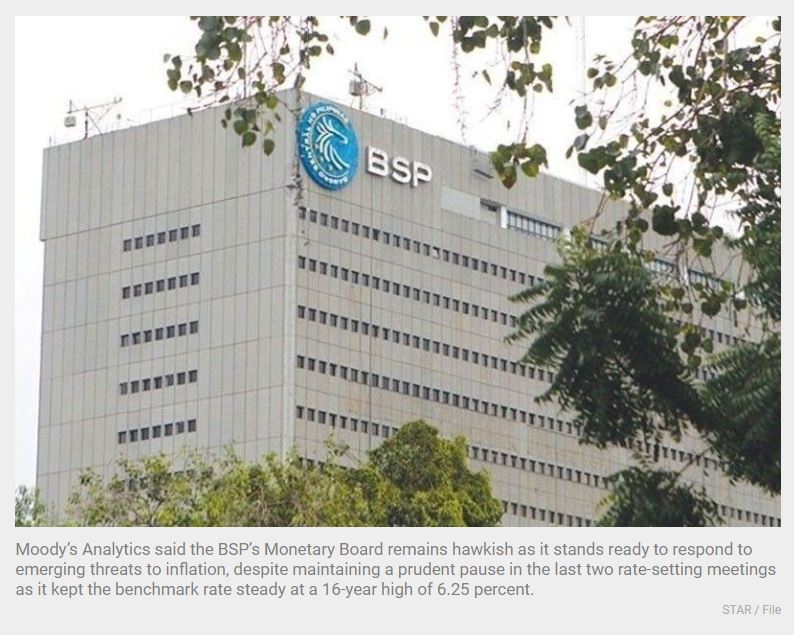Philippines: Economists give mixed views on BSP rate moves
MANILA, Philippines — While most economists are convinced the Bangko Sentral ng Pilipinas (BSP) has ended its tightening cycle by keeping key policy rates steady over the past two months, some still believe the door for rate hikes remains open.
Moody’s Analytics said the BSP’s Monetary Board remains hawkish as it stands ready to respond to emerging threats to inflation, despite maintaining a prudent pause in the last two rate-setting meetings as it kept the benchmark rate steady at a 16-year high of 6.25 percent.
“A statement from the Monetary Board that it stands ready to respond to emerging threats to inflation has left the door ajar for more tightening if inflation disappoints in the coming months,” Moody’s Analytics said.
After a year-long tightening cycle that led to a 425-basis-point jump in key policy rates, the inflation downtrend and robust gross domestic product (GDP) growth allowed the BSP to take a prudent pause by keeping interest rates on hold.
“Cooling headline and core inflation readings in recent months have given it the confidence to hold fire,” the research arm of the Moody’s Group added.
Inflation averaged 7.5 percent in the first five months of the year, still way above the BSP’s two to four percent target, despite easing to a 12-month low of 6.1 percent in May.
However, the BSP believes inflation will ease below four percent by October and November, prompting it to lower its inflation forecast to 5.4 percent from 5.5 percent for this year.
DBS Bank senior economist Radhika Rao and ASEAN economist Chua Han Teng said the BSP’s rhetoric remained hawkish despite maintaining key policy rates unchanged in May and June.
“We maintain our view for the policy rate to stay steady at 6.25 percent for the rest of the year, as it continues to anchor inflation expectations. With CPI inflation, both headline and core, moderating further in May, and the outlook still consistent for a return to the BSP’s two to four percent inflation target band by end-2023, status quo was seen as the most prudent option,” Rao and Teng said.
The Singaporean bank sees inflation easing to 5.4 percent for 2023 and further to 3.2 percent in 2024.
“Yet the BSP has left the door open to resume monetary tightening, if needed, given upside price risks. These could come from additional transport fare increases and minimum wage adjustments, persistent supply constraints of key food items, and El Niño weather conditions,” the economists said.
They added that policy rate cuts are not on the table yet,and are more likely to be in 2024, depending on inflation dynamics, and perhaps also the US Fed.
In a separate commentary, BMI Country Risk & Industry of the Fitch Group said it is now convinced that the BSP is likely to keep key policy rates steady for the rest of the year and a rate cut is possible in the first half of next year together with other global central banks led by the US Federal Reserve.
“Given that inflation is falling faster than what we originally anticipated, economic activity is starting to soften and the US Fed is nearing the end of its tightening cycle, we now expect the BSP to keep the overnight reverse repurchase facility rate unchanged for the remainder of the year, marking a change from our previous view for an additional hike,” BMI said.
BMI, formerly Fitch Solutions, said it expects inflation to fall to 3.2 percent by the end of the year and average at 5.7 percent for 2023, slightly below last year’s average of 5.8 percent.
The research arm believes the country’s GDP growth would slow significantly to 5.9 percent this year after accelerating to 7.6 percent last year from 5.7 percent in 2021. This is well below the six to seven percent target penned by the Development Budget Coordination Committee (DBCC).
“Economic weakness will also become more apparent, setting the stage for the policy rate to be kept on a prolonged hold for the rest of the year,” it added.
According to BMI, lagged effects of policy tightening alongside weak global demand would weigh on the economy.
Outgoing BSP Governor Felipe Medalla earlier said a rate cut is likely to be considered early next year if inflation falls below three percent.
Source: https://www.philstar.com/business/2023/06/27/2276736/economists-give-mixed-views-bsp-rate-moves


 English
English




